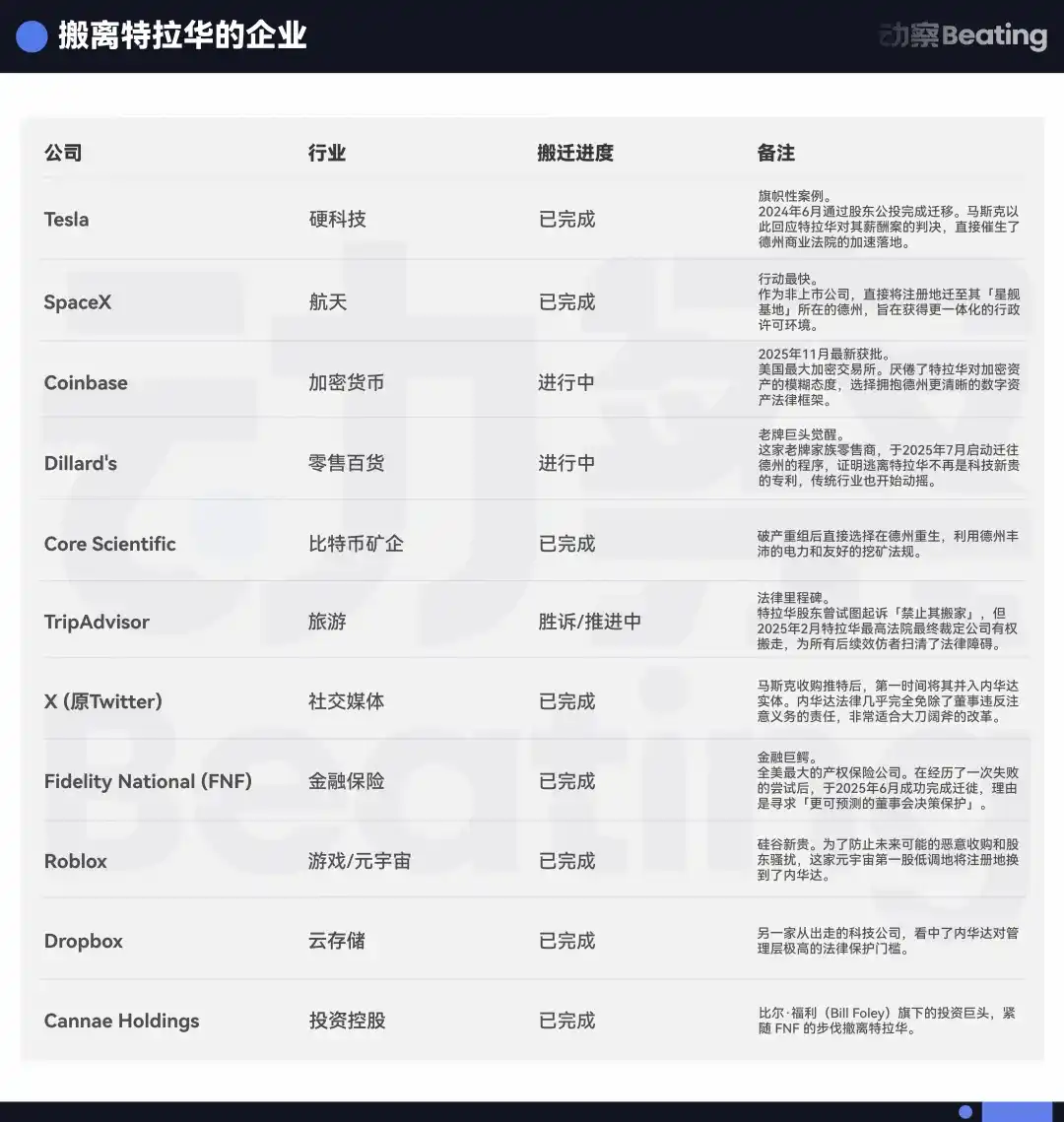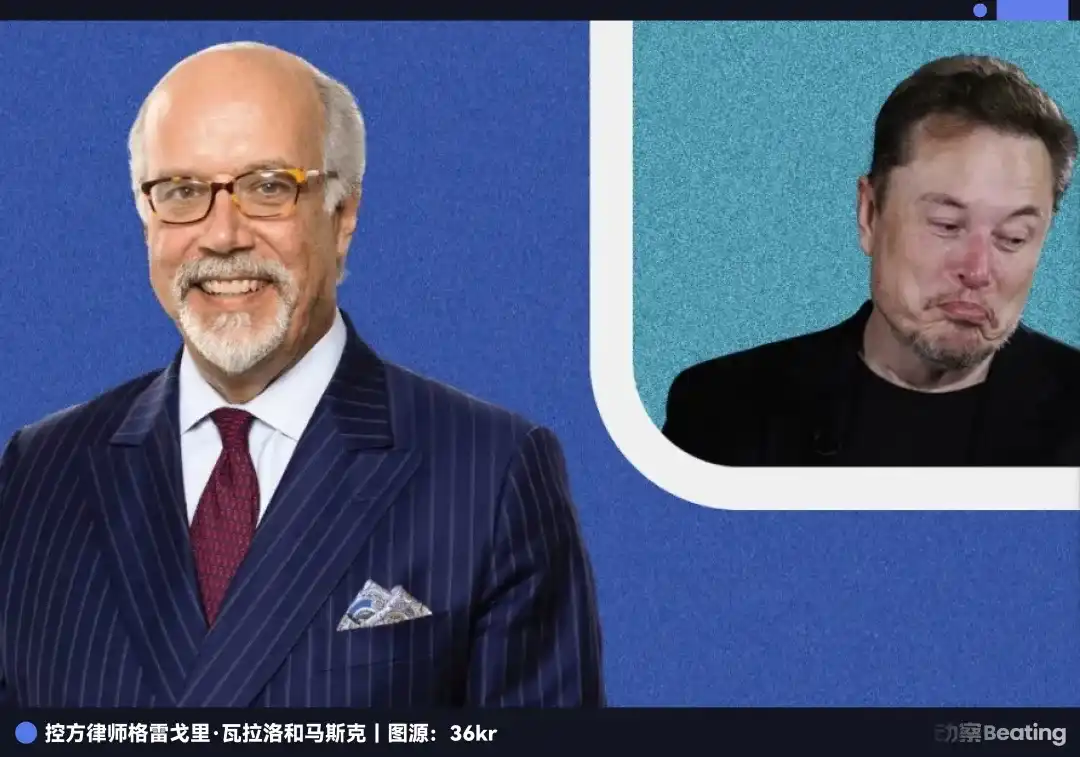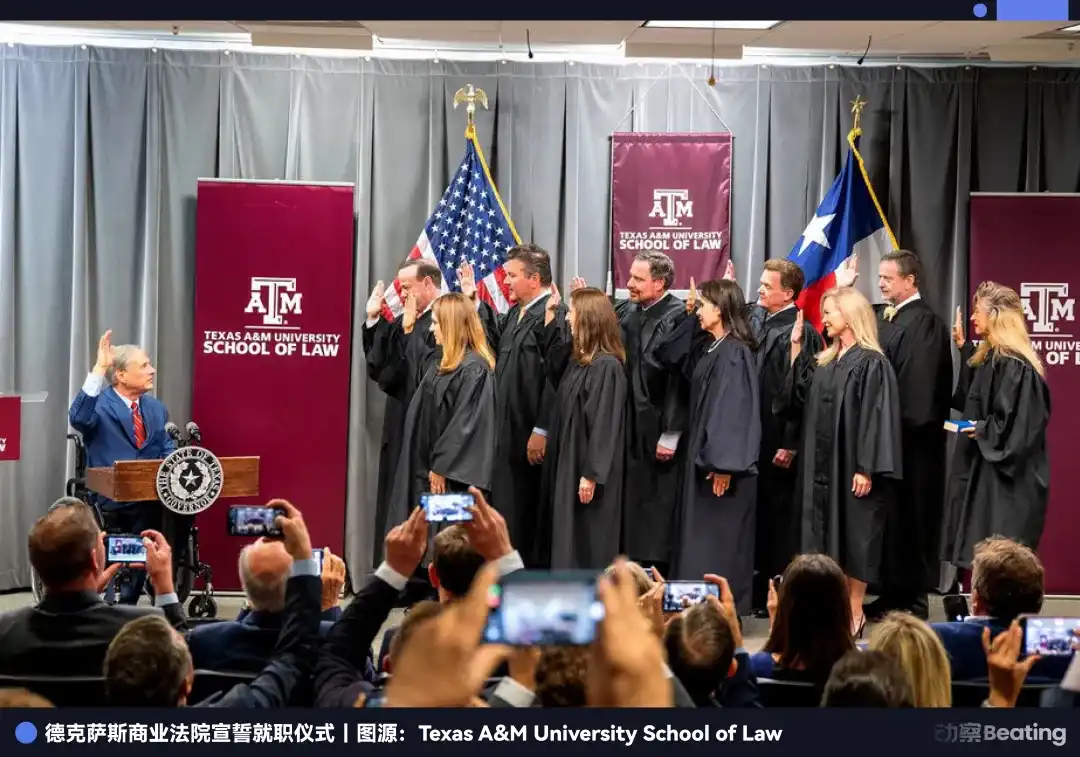Original Title: "Breaking Up with Delaware: Musk and Coinbase's Great Escape"
Original Author: Sleepy.txt, Dongcha Beating
On the map, the United States remains a unified federation; but in the dimension of business logic, we are witnessing the country tear apart into "two nations."
In early winter 2025, Coinbase, the largest cryptocurrency exchange in the United States, officially initiated the process of relocating its registered office from Delaware to Texas.
In the long narrative of American business history, it is hard to overlook the resolute sense of tragedy behind this decision—this is not merely an administrative address change; it feels more like a spiritual "patricide" and "apostasy."
For the past hundred years, Delaware has been the undisputed "Mecca" of American business civilization, the highest totem of the industrial rationality era.
The term "Mecca" implies that it is not just a geographical coordinate but also a destination of faith. On this narrow peninsula, which is less than two thousand square miles in area, more than 66% of the Fortune 500 companies in the United States are located.
In the traditional narratives of Wall Street and Silicon Valley, a great company may be born in a garage in California, but its soul (legal entity) must be placed in Delaware.
There, the oldest and most specialized Court of Chancery in the United States exists. For investors and professional managers of that era, Delaware represented an almost religious certainty—there were the most comprehensive fiduciary duties, the most predictable case law, and a sense of security known as the cornerstone of business.
But now, this rock that has carried a century of business faith has already shown shocking cracks.
Coinbase's departure is not an isolated case; if you spread out the list of this round of migrations, you will find it filled with today's most restless and wild names.
Elon Musk is the primary driver of this exodus.
The catalyst occurred a year ago. In a shocking ruling, a Delaware judge decisively stripped Musk of the $56 billion compensation package he had spent ten years negotiating. Even though he miraculously achieved what Wall Street once deemed impossible performance targets, pushing Tesla's market value to a trillion-dollar peak, the judge still shredded this results-based contract, citing "the board's lack of independence."
This ruling infuriated the new elites of Silicon Valley. Subsequently, this "Iron Man" angrily took Tesla and SpaceX, decisively sailing south to Texas like the famous Mayflower. Now, unicorns like Coinbase and TripAdvisor are also following suit, joining the ranks of the escapees.

This series of departing figures heralds the twilight of an old era.
Once, large companies remained in Delaware to seek protection, as it represented the maturity and rationality of the rule of law; now, for survival and wild growth, the top enterprises believe they must escape Delaware to feel safe.
For freedom, blood must be shed
In the brutal laws of the business world, freedom has never been free. But for Musk and Coinbase, the price of this freedom is shockingly high.
In the public's general perception, changing a company's registered office seems like a simple administrative procedure—just fill out a few forms and change the address. But in reality, this is not a "move" that can be settled with a few tens of thousands of dollars in administrative fees; giants must pay a suffocating bill.
First, they must hire top law firms. Firms like Wachtell and Sullivan & Cromwell, which sit at the pinnacle of the pyramid, have partner rates that have long surpassed $2,000 per hour. Just to draft the hundreds of pages of a Proxy Statement that meets SEC regulatory requirements, the bill can easily exceed $5 million.
Next is the expensive ballot war. To persuade skeptical institutional shareholders like BlackRock and Vanguard, companies need to hire professional proxy solicitation firms. For mega-cap stocks like Tesla, this "campaigning fee" alone can reach millions of dollars, and it must involve months of roadshows and lobbying, just like running for President of the United States.
The most fatal risk is the potential for default. Legal teams need to work day and night reviewing tens of thousands of commercial contracts because once the registered office changes, many "change of control" clauses in bond agreements may be triggered instantly.
To obtain waivers from creditors, companies often have to pay additional fees. According to market practices, this fee typically ranges from 0.25% to 0.5% of the total bond amount. For giants with substantial existing debt, this means an instant evaporation of tens of millions or even hundreds of millions of dollars in cash flow—funds that could have been used for research and development or buybacks now become huge sunk costs.
Given the heavy cost, why would they rather "break an arm" to leave?
The answer lies in the shadows beneath Delaware's shiny legal facade.
For today's tech giants, Delaware is no longer a safe haven but a hunting ground filled with traps. Here, a large, secretive, and greedy group thrives—the Plaintiffs' Bar.
On Wall Street, this is jokingly referred to as a "merger tax." Statistics show that during the peak of the past decade, over 90% of mergers valued at over $100 million faced lawsuits in Delaware. These lawyers do not care about corporate governance; they are like sharks smelling blood, needing only to hold one share of stock in a company to immediately file a class-action lawsuit on the grounds of "insufficient disclosure" once the company makes a significant announcement.
This has long since evolved into a standardized "extortion assembly line": sue, obstruct transactions, and force companies to settle. The vast majority of companies, in order not to delay the transaction process, have no choice but to pay this "toll," which can often reach millions or even hundreds of millions of dollars.
Dell, Activision Blizzard, Match Group… flipping through Delaware's case law, countless large companies have been "extorted." Here, companies are no longer protected clients of the law but rather legally hunted prey.
This bloodsucking reached an absurd peak in the Tesla compensation case.

When the Delaware judge ruled Musk's compensation plan invalid, the plaintiff's lawyer team even applied to the court for 29.4 million shares of Tesla stock as a victory fee. Based on the stock price at the time, this fee was worth up to $5.6 billion.
$5.6 billion is enough to directly buy the largest department store chain in the United States, Macy's.
At this moment, the truth is laid bare.
This is no longer a manifestation of legal justice; it is a naked plunder of wealth creators. It is this heavy blow that has completely disheartened Musk and made Coinbase, watching from the sidelines, feel a chill down its spine.
Coinbase's management is well aware that although the knife has not yet fallen on them, remaining in this old world filled with "professional plaintiffs" and "sky-high legal fees" means being harvested is just a matter of time.
The giants have calculated the costs; while the current legal fees, administrative fees, and public relations fees can easily reach tens of millions or even hundreds of millions, that is merely a short-term pain. If they continue to stay in Delaware, in such a legal ecosystem, losing control of the company and being forced to accept endless litigation extortion would be an incurable "cancer."
For freedom, blood must be shed.
The ruler of the old world cannot measure the ambitions of the new world
If the exorbitant "ransom fee" only causes pain for Musk and others, then the underlying conflict of Delaware's legal logic is the fundamental reason that suffocates them.
This is not merely a debate over legal terms; it is the ultimate clash of two commercial civilizations.
For the past hundred years, Delaware has maintained its iron throne in business because it has forged a tacit golden contract with the American business community—the Business Judgment Rule.
Its subtext is that as long as the board does not embezzle or break the law, judges will not interfere with how you do business. This is an ultimate respect for entrepreneurial spirit and the cornerstone of American business prosperity.
However, in recent years, this ruler has deformed under the erosion of time. With the infinite expansion of institutional investors' weight, Delaware's gavel has increasingly swung to the other extreme—the Entire Fairness Standard.
This is a term that sends shivers down the spines of all Silicon Valley founders. Its subtext is: "I don't care whether you create a business miracle; as long as the process does not meet my requirements, your success is meaningless."
Musk's $56 billion compensation, which was wiped out in one stroke, is a victim of this microscope-style judgment.
In that lawsuit, despite Tesla achieving the most insane performance growth in human business history, and despite shareholders reaping enormous profits, the Delaware judge still coldly ruled Musk's compensation invalid. The reason was simply that the board members were too close to Musk, and the process was not "perfectly independent."
This arrogance of "prioritizing process over results" may serve as a safe guardrail for traditional companies like Coca-Cola, which are managed by professional managers; but for new species like Coinbase and Tesla, which rely on founders to drive exponential growth, it is a fatal shackle.
The ruler of the old world can no longer measure the ambitions of the new world.
Delaware judges can read the reports of steel, oil, and railroads, but they struggle to understand why Musk's personal IP is worth $50 billion.
While Delaware indulges in moral scrutiny, Texas pragmatically throws out an ambitious "partnership agreement."
This is not an empty "Texas welcomes you." In September 2024, the Texas Business Court officially opened its doors. This is not just a new institution; it is a precise strike by Texas against Delaware's pain points.

It is responsible for handling high-stakes cases. According to the legislation, this court has exclusive jurisdiction over commercial disputes involving amounts exceeding $5 million; for publicly traded companies, only cases involving amounts over $10 million are eligible to enter. This means that small shareholder harassment lawsuits are directly kept out.
Even more disruptive is the judge appointment process. Unlike Delaware's justices, who serve terms of up to 12 years and come from legal families, Texas Business Court judges are directly appointed by Governor Greg Abbott and serve only 2-year terms.
This means that judicial power and executive power have reached an unprecedented tacit understanding in the goal of "doing business." If a judge's ruling is unfavorable to the business environment, he may lose his job in two years. The message Texas conveys is very blunt: "Here, we don't teach you how to be a person; we don't have a paternalistic attitude. We only protect contracts. As long as you can bring jobs and growth, we will protect you."
Coinbase and Musk, representing the "founder model," are no longer willing to bow to the "manager model" represented by Delaware. They have had enough of being treated as beasts that must be guarded against. Thus, they choose to pack their bags and leave the exquisite yet suffocating greenhouse, heading towards the rough but wild-growing wilderness.
Drifting America
This may not signify the end of Delaware. For a long time to come, it will still be home to Coca-Cola, Walmart, and General Electric.
For these "old aristocrats" who pursue stable dividends, value ESG ratings, and are accustomed to professional managerial governance, Delaware's intricate and cumbersome rules remain the best safety belt.
But for another group of people, the air there has become too thin to breathe.
We are witnessing America tear into "two nations."
One represented by Delaware and New York. Here, distribution, checks and balances, and political correctness are emphasized; it resembles a refined museum, orderly yet exuding a stale atmosphere.
The other represented by Texas and the new frontier. Here, growth, efficiency, and even a kind of wild vitality are emphasized, dangerous yet full of possibilities.
The exodus of Coinbase and Musk is just the beginning. They are like canaries in a coal mine, using their sensitive instincts to sense the tremors deep within the strata before anyone else.
Of course, this migration is not without risks.
The newly established business court in Texas has yet to undergo the stress test of a major economic crisis, and its power grid remains fragile in the face of snowstorms. No one can guarantee that this place will certainly give birth to the next century's business legend.
But this is precisely what is most fascinating and cruel about business—it never promises certainty; it only rewards those who dare to bet in the face of uncertainty.
In this high-stakes gamble about the future, capital has cast the most honest vote with its feet. It tells us that when the order of the old world begins to solidify into constraints, the instinct for innovation will always run towards that barren land that allows for wild pursuits.
免责声明:本文章仅代表作者个人观点,不代表本平台的立场和观点。本文章仅供信息分享,不构成对任何人的任何投资建议。用户与作者之间的任何争议,与本平台无关。如网页中刊载的文章或图片涉及侵权,请提供相关的权利证明和身份证明发送邮件到support@aicoin.com,本平台相关工作人员将会进行核查。




